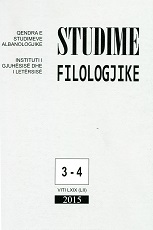Krisja e parë në brezin e viteve 1960: rasti i novelës “Dikush më buzëqeshte”
The first collision in the 1960s generation; the case of the short novel “Somebody smiled at me”
Author(s): Shaban SinaniSubject(s): Metaphysics, Oral history, Novel, Albanian Literature, Hermeneutics
Published by: Qendra e Studimeve Albanologjike
Keywords: novel; “Dikush më buzëqeshte”; "Somebody smiled at me"; Albanian literature;
Summary/Abstract: Albanian literature has created myths and demons in all periods. Oral literature inherited the demonization of the most powerful medieval kingdoms of the time before ottomans: the deception of republic of Saint Mark through the figure of baiulus, bailo; so much as the deception of kingdom of Aragon (through the figure of katallan and saraçen). The literature of Romanism demonized the turkish dog, but, without arriving till to the demonization of neighbors, which was shown in the period under the control of the state, especially with Lahuta e Maids (Gj. Fishta, 1937), where Albanians and Slavs are born n’mëni t’ sho’shojt (angry with each - other). The literature of socialist realism, as a literature of contradicts and antagonism, except the traditional demonizations, created the demonized Europe, the demonized west, that always constructs anti - Albanian projects, together with its supporters inside: diversionists, agents, declasses pennons influenced by bourgeoisie. Démonisation in Albanian literature of socialist realism arrived till in the deception of the write by the write. It is known the public polemics that caused short story “Dikush më buzëqeshte” (F. Arapi, 1972), where, in 5 - 6 pages, added after the decision of its publishing, the author aimed the satirization of the novel “Kronikë në gur” and of its author, too. According the relators of the time, through the short story “Dikush më buzëqeshte” author wanted to devalue non-heroic childhood of the author of the novel Kronikë në gurë. This phenomenou arrived till the creation of a tradition of counterworks: the story Tregtar e skeleteve (K. Trebeshina, Prishtinë 2006), is shown like a counter work against the novel (Gjenerali i ushtrisë së vdekur; Mekami, Turkish medody (K. Trebeshina, Prishtinë 1994) counterstays to the novel “Kështjella”, while Kukudhi (K. Trebeshina, 1993) satirizes “Kush e solli Doruntinën”. Démonisation of I. Kadaré, as a port of the tradition of politic use of the intellectuals, for paradox, had also its international component, with the inclusion of foreign scholars in investigation of enemies or their invention in Kadaré’s work.
Journal: Studime Filologjike
- Issue Year: 2015
- Issue No: 03-04
- Page Range: 129-143
- Page Count: 15
- Language: Albanian

